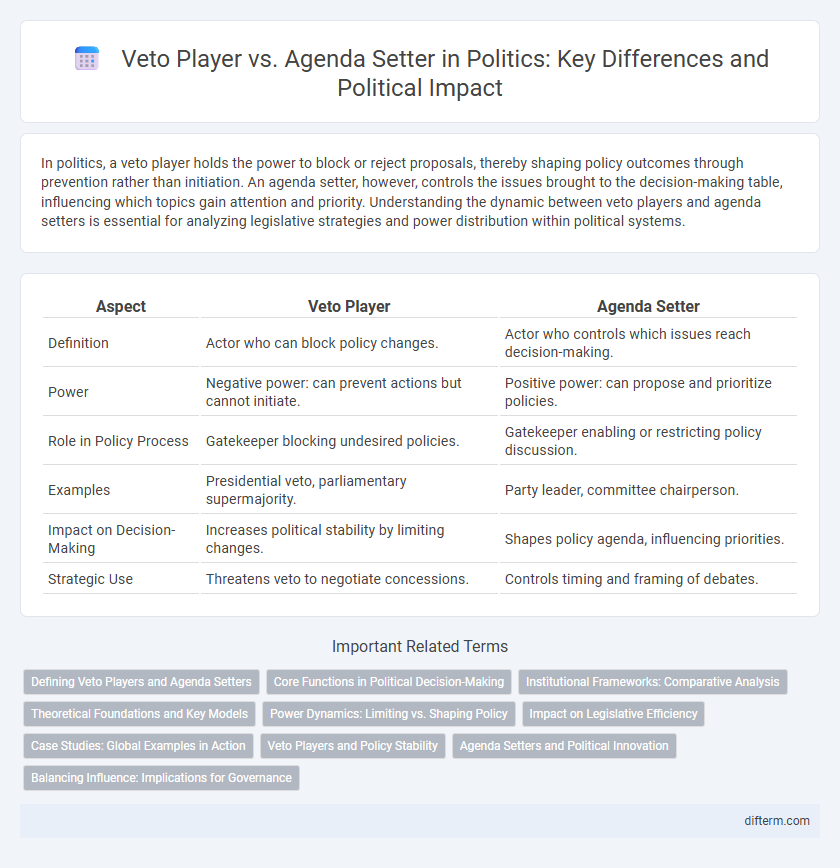In politics, a veto player holds the power to block or reject proposals, thereby shaping policy outcomes through prevention rather than initiation. An agenda setter, however, controls the issues brought to the decision-making table, influencing which topics gain attention and priority. Understanding the dynamic between veto players and agenda setters is essential for analyzing legislative strategies and power distribution within political systems.
Table of Comparison
| Aspect | Veto Player | Agenda Setter |
|---|---|---|
| Definition | Actor who can block policy changes. | Actor who controls which issues reach decision-making. |
| Power | Negative power: can prevent actions but cannot initiate. | Positive power: can propose and prioritize policies. |
| Role in Policy Process | Gatekeeper blocking undesired policies. | Gatekeeper enabling or restricting policy discussion. |
| Examples | Presidential veto, parliamentary supermajority. | Party leader, committee chairperson. |
| Impact on Decision-Making | Increases political stability by limiting changes. | Shapes policy agenda, influencing priorities. |
| Strategic Use | Threatens veto to negotiate concessions. | Controls timing and framing of debates. |
Defining Veto Players and Agenda Setters
Veto players are individuals or groups whose agreement is essential for altering the status quo in policy decisions, effectively possessing the power to block proposals. Agenda setters control the initiation and prioritization of issues that enter the decision-making process, shaping the political discourse and range of options considered. Understanding the distinction between veto players and agenda setters is crucial for analyzing political power dynamics and policy outcomes.
Core Functions in Political Decision-Making
Veto players possess the power to block or reject policy proposals, shaping the boundaries of feasible political outcomes through their ability to halt decisions. Agenda setters control which issues reach the decision-making table, influencing the political discourse and framing the choices available to policymakers. Together, veto players and agenda setters define the core functions of political decision-making by controlling both the initiation and approval stages of policy formulation.
Institutional Frameworks: Comparative Analysis
Veto players and agenda setters are pivotal actors within institutional frameworks that shape policy outcomes through their capacity to block or advance proposals. Veto players, such as presidents or upper legislative chambers, possess formal rights to reject legislation, thereby increasing the complexity of policy change and requiring broader consensus. Agenda setters, including committee chairs or ruling parties, control the flow of issues brought to the decision-making body, influencing which policies receive consideration and ultimately shaping institutional policy dynamics across different political systems.
Theoretical Foundations and Key Models
Veto player theory, introduced by George Tsebelis, analyzes political stability through the preferences of institutional actors whose consent is necessary for policy change, emphasizing the difficulty of altering status quo in systems with multiple veto players. Agenda-setting models, grounded in spatial theory and median voter theorem, focus on the power to shape policy outcomes by controlling the order and scope of choices presented to decision-makers. Understanding the interplay between veto players and agenda setters is crucial for modeling legislative bargaining, institutional constraints, and the dynamics of policy change across parliamentary and presidential systems.
Power Dynamics: Limiting vs. Shaping Policy
Veto players hold the power to block policy changes, effectively limiting the range of feasible options and ensuring stability within political systems. Agenda setters, conversely, shape policy by prioritizing issues and framing debates, influencing which proposals reach consideration. The dynamic interplay between veto players' constraints and agenda setters' influence determines the pace and direction of political decision-making.
Impact on Legislative Efficiency
Veto players, who possess the power to block legislation, often reduce legislative efficiency by creating higher obstacles to policy change, leading to gridlock. Agenda setters, controlling the legislative agenda, enhance efficiency by prioritizing bills and framing debates, which can streamline decision-making processes. The interaction between veto players and agenda setters critically shapes policy outcomes, as stronger veto players require more strategic agenda setting to navigate legislative hurdles effectively.
Case Studies: Global Examples in Action
Veto players and agenda setters shape political outcomes by controlling decision-making thresholds and the flow of policies, respectively. In the United States, veto players such as the Senate and the President can block legislation, while agenda setters in Congress influence which bills reach the floor. Globally, Germany's coalition governments demonstrate the power of multiple veto players, whereas agenda setters in the UK Parliament, like the Prime Minister, drive policy priorities.
Veto Players and Policy Stability
Veto players are crucial actors whose agreement is necessary for policy change, significantly contributing to policy stability by limiting the range of feasible reforms. The greater the number of veto players in a political system, the higher the policy rigidity, as each actor's consent is required to alter the status quo. This dynamic makes veto players key determinants of political bargaining outcomes and institutional durability.
Agenda Setters and Political Innovation
Agenda setters hold pivotal power in shaping policy by prioritizing issues and framing debates, which decisively influences legislative outcomes. Their ability to introduce innovative political ideas and reforms fosters adaptive governance, allowing systems to respond to emerging challenges effectively. By controlling the agenda, they create opportunities for novel policy solutions that may bypass existing veto players' constraints.
Balancing Influence: Implications for Governance
Veto players hold the power to block policies, shaping governance by limiting what can be enacted, while agenda setters control which issues reach the decision-making stage, steering political priorities. The balance between these roles influences policy stability and change, as an abundance of veto players may cause gridlock, whereas strong agenda setters can push through agendas efficiently. Understanding this dynamic is crucial for predicting legislative outcomes and designing institutions that achieve effective governance.
veto player vs agenda setter Infographic

 difterm.com
difterm.com